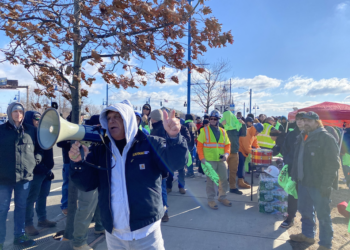After securing numerous government approvals for the long-delayed Hudson Steppe housing project in the Village of Ossining, spending more than $1.3 million on fees and back taxes, getting a building permit and starting site work, the village abruptly stopped the project.
Ossining Land LLC claims that an inspector’s decision to invalidate the building permit was unlawful, and it petitioned Westchester Supreme Court on Jan. 13 to compel the inspector to renew the permit.

If the permit is not reinstated, the developer argues, the village could also cancel several land-use approvals, “jeopardizing the revitalization of the dilapidated, run-down parcels of land in the village’s downtown that will provide much needed housing (as well as affordable housing) to the residents of the village.”
Stuart E. Kahan, the village’s corporate counsel, said the action by the building inspector “to revoke the building permit was taken in accord with the village code.” He offered no additional comment on the allegations, stating that village had not been served with the lawsuit.
The 5.9-acre Hudson Steppe property at 34 State St. was once home to a wallpaper factory and offices, and it includes the Smith-Robinson House, a mid-1800s mansion that is on the village’s register of historic properties.
The developer wants to erect three buildings with 189 apartments on a slope overlooking the Hudson River and to renovate the mansion for use as offices.
Ossining Land is affiliated with North Hill Capital Management, Manhattan, and is operated by Jonathan Kloos of Metropolis Realty Advisors.
From 2004 through early 2021, the architectural review board, historic preservation commission, planning board, zoning board and village trustees granted several land-use approvals for the project, according to the petition.
The building permit was approved a year ago for construction estimated at $34.5 million. Work had to begin within six months, by village code, or no later than July 19.
Ossining Land says that preparations such as stockpiling materials and fencing began in early June. Excavation started on July 16.
On July 19, the deadline for beginning the work, Kahan, the village attorney, exchanged emails with Kloos, acknowledging that excavation had started, according to the petition.
But on Sept. 15, Building Inspector Joseph Agostinelli notified the developer in an email that the building permit was “invalid and closed” because work had not commenced in time.
The inspector said “a new permit application with all the associated documents, plans, and permit fees will be required … if you are moving forward with the proposed scope of work.”
The problem, according to the petition, is that work was being done by a subcontractor, JDA Contracting Corp., Ossining, and not by ASF Construction & Excavation Inc., the Cortlandt Manor contractor listed on the building permit.
Ossining Land argues that the village code does not require a subcontractor to be listed on a building permit application, and that the village acted in bad faith by not holding a hearing to allow the developer to defend its actions.
The developer demanded that the permit be reinstated, in a letter to Agostinelli, according to the petition, but received no response.
Then, Kahan allegedly advised Ossining Land to take up the issue to the Village Code Board of Appeals, an entity that the developer says does not exist.
Kahan said the building permit was “effectively revoked,” in a letter to the developer’s attorney, Darius P. Chafizadeh, White Plains, and was not subject to renewal. Ossining Land would have to “start the process anew.”
The developer argues that Agostinelli does not have the discretion to invalidate a permit where work began before the six-month commencement deadline.
Ossining Land is asking the court to set aside the building inspector’s action and compel him to renew the permit.

















